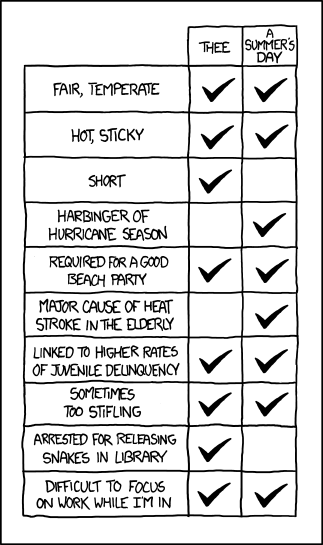Difference between revisions of "1026: Compare and Contrast"
(→Explanation) |
(Added incomplete tag) |
||
| Line 8: | Line 8: | ||
==Explanation== | ==Explanation== | ||
| + | {{incomplete|This needs a LOT more explanation of the individual lines.}} | ||
| + | |||
A reference to the most well-known {{w|sonnet}} in the English-speaking world: {{w|William Shakespeare|William Shakespeare's}} "{{w|Sonnet 18}}", the first line of which is: "Shall I compare thee to a summer's day?". In this comic [[Randall]] sets about this in a typically goal-oriented chart, as opposed to the rather more romantic poetry of the Bard. | A reference to the most well-known {{w|sonnet}} in the English-speaking world: {{w|William Shakespeare|William Shakespeare's}} "{{w|Sonnet 18}}", the first line of which is: "Shall I compare thee to a summer's day?". In this comic [[Randall]] sets about this in a typically goal-oriented chart, as opposed to the rather more romantic poetry of the Bard. | ||
Revision as of 17:51, 1 January 2016
| Compare and Contrast |
 Title text: Frankly, I see no difference between thee and a summer's day. Only Ron Paul offers a TRUE alternative! |
Explanation
| |
This explanation may be incomplete or incorrect: This needs a LOT more explanation of the individual lines. If you can address this issue, please edit the page! Thanks. |
A reference to the most well-known sonnet in the English-speaking world: William Shakespeare's "Sonnet 18", the first line of which is: "Shall I compare thee to a summer's day?". In this comic Randall sets about this in a typically goal-oriented chart, as opposed to the rather more romantic poetry of the Bard.
The first line is a reference to the sonnet itself, which reads: "Thou art more lovely and more temperate". The last line is a sexual reference, on the "thee" side, not on the "summer's day" side.
In Shakespeare's day, English had informal pronouns and formal pronouns, thou/thee (informal), and ye/you (formal). This is similar to what is still used today in many European languages. Wikipedia has a nice chart for all of English's personal pronouns, current and archaic.
For both the chart and the original sonnet, whether or not the work is autobiographical is unknown. Also unknown is the identity of the person whom each work refers to. It is believed that Sonnet 18 is addressed to a young man.
And of course, the title text is a reference to Ron Paul, a former Republican candidate for President who was on top in the Republican Primary against a few other challengers for the nomination. Ron Paul was frequently represented on the internet using similar language to the image text. Paul has been seen as an alternative because he is a strict Libertarian and believes the government should be as small as possible and stay out of people's lives.
Transcript
- [A checklist comparing thee to a summer's day:
- Fair, Temperate: Thee & A Summer's Day
- Hot, Sticky: Thee & A Summer's Day
- Short: Thee
- Harbinger of Hurricane Season: A Summer's Day
- Required for a Good Beach Party: Thee & A Summer's Day
- Major Cause of Heat Stroke in the Elderly: A Summer's Day
- Linked to Higher Rates of Juvenile Delinquency: Thee & A Summer's Day
- Sometimes Too Stifling: Thee & A Summer's Day
- Arrested for Releasing Snakes in Library: Thee
- Difficult to Focus on Work While I'm In: Thee & A Summer's Day]
Discussion
Commenter J. Curwen posted a link to a modern paraphrasing of Sonnet 18. I think it would be appropriate to repost it here. http://www.shakespeare-online.com/sonnets/18detail.html lcarsos (talk) 17:58, 16 August 2012 (UTC)
Shakespeare woos Randall with charts? Holy ambiguous dependent, Batman! - Frankie (talk) 12:47, 26 January 2013 (UTC)
I prefer to believe that thou art in fact harbinger of hurricane season, and a major cause of heatstroke in the elderly ;) PotatoGod (talk) 05:26, 22 December 2017 (UTC)
Are we sure that Sonnet 18 is *the* most famous sonnet? Is opening the explanation in this way a subtle reference to xkcd 1368 ("one of the most recognisable arches in St. Louis")? 172.70.90.92 04:47, 12 January 2024 (UTC)
